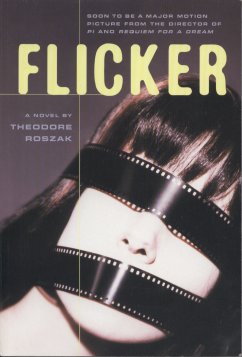Roszak Theodore
Flicker

“A movie-loverīs delight”- thatīs what it says on the cover of this book, and itīs certainly true. So if the reader doesnīt belong to the chosen ones it takes her some time to come to grips with the story. For quite a number of pages, I must admit, I thought I was reading a rather academic history of film-making seen through the eyes and mind of the hero Jonathan Gates.
We meet him as a student of the cinematic art, who falls in love with Clarissa Swann, a true cineast. She runs a small crypt-like theater in a “grubby basement” in Los Angeles, where our Jonny sees his first Max Castle film. Clare introduces him to the pleasures of love and film. Like Forrest Gump Jonny meets all the important directors of his time and some of the film stars and he himself becomes an authority on Max Castle and a professor in due course, whereas Clare moves on to become a renowned film critic. Jonny watches his favourite Castle films again and again until he discovers the “Flicker”, a technique where the celluloid is arranged in layers, so that, for a split second, a gory scene reveals itself only to the viewerīs subconscious, leaving him with a vague feeling of horror and sadness.
Gates is strangely fascinated by Castle. He finds out that the director belonged to an obscure group, called the “Storm Orphans”, started his career in Germany, then went to the States, where he made some films, that were moderately successful. When he went back to Europe during WWII he mysteriously disappeared. So Gates follows his traces to Paris and meets his own French counterpart, the very arrogant film professor Saint-Cyr. This chapter “Neurosemiology” is the best of the book. Roszak obviously has had traumatic encounters with conceited French left-wing intellectuals and maliciously depicts this Saint-Cyr, vain as a peacock, surrounded by his obsequious disciples and talking utter nonsense. Itīs pure bliss!
Anyway, the narrative twists and turns like Gates on his pursuit of Castle. He locates the mysterious “Orphanage”, finds out, that they regard themselves as members of the ancient Manicheans who plan to put an end to the world as soon as possible. As he comes ever closer to discover the ultimate truth about them and Castle, he is kidnapped and ends up on a deserted island in the South Seas, where he finally meets the frail old Castle. In his primitive studio Jonny learns the “Flicker” technique and they start “Paleolithic Productions” with out-of-date equipment.
And here the story becomes truly tragic. They use old film rolls and are never able to see the films they produce, because in the projector they fall to pieces.
So in the end “Flicker” turns out to be a great, if complex book. Max Castle is purely fictional, by the way, although Roszak added a filmography and appendix in the 2005 edition.